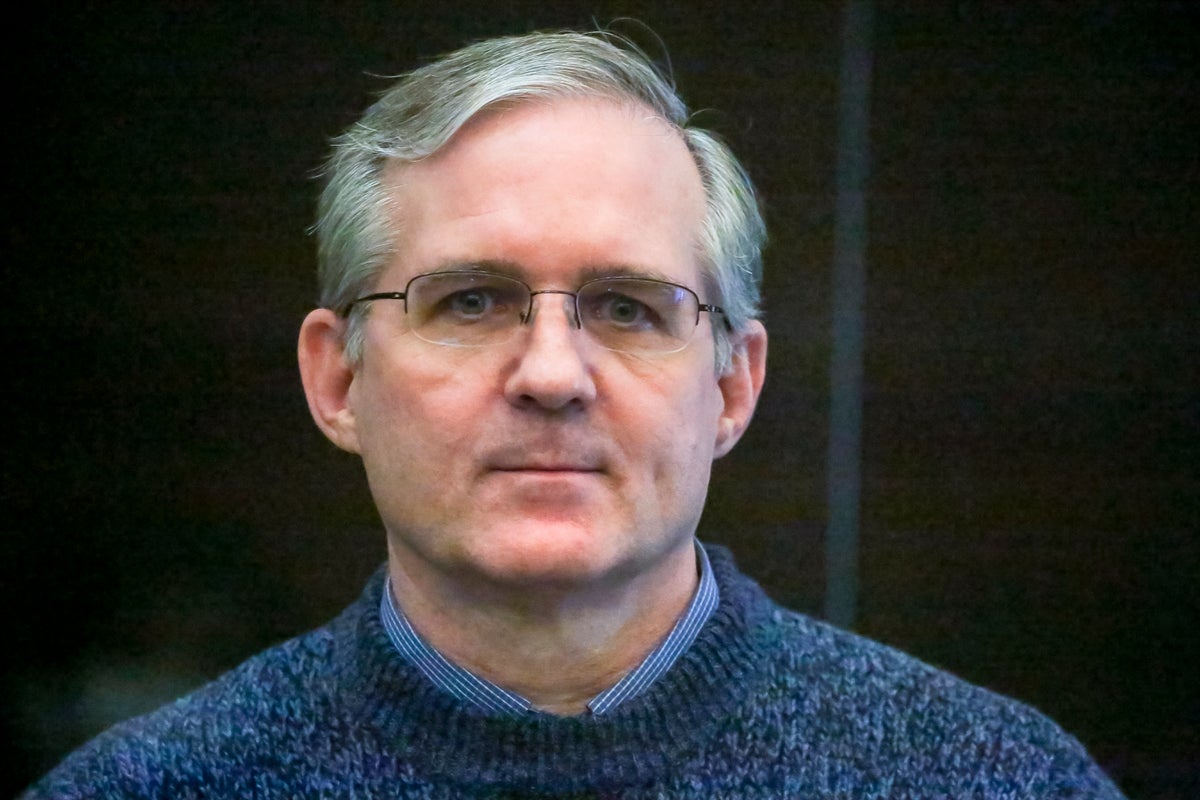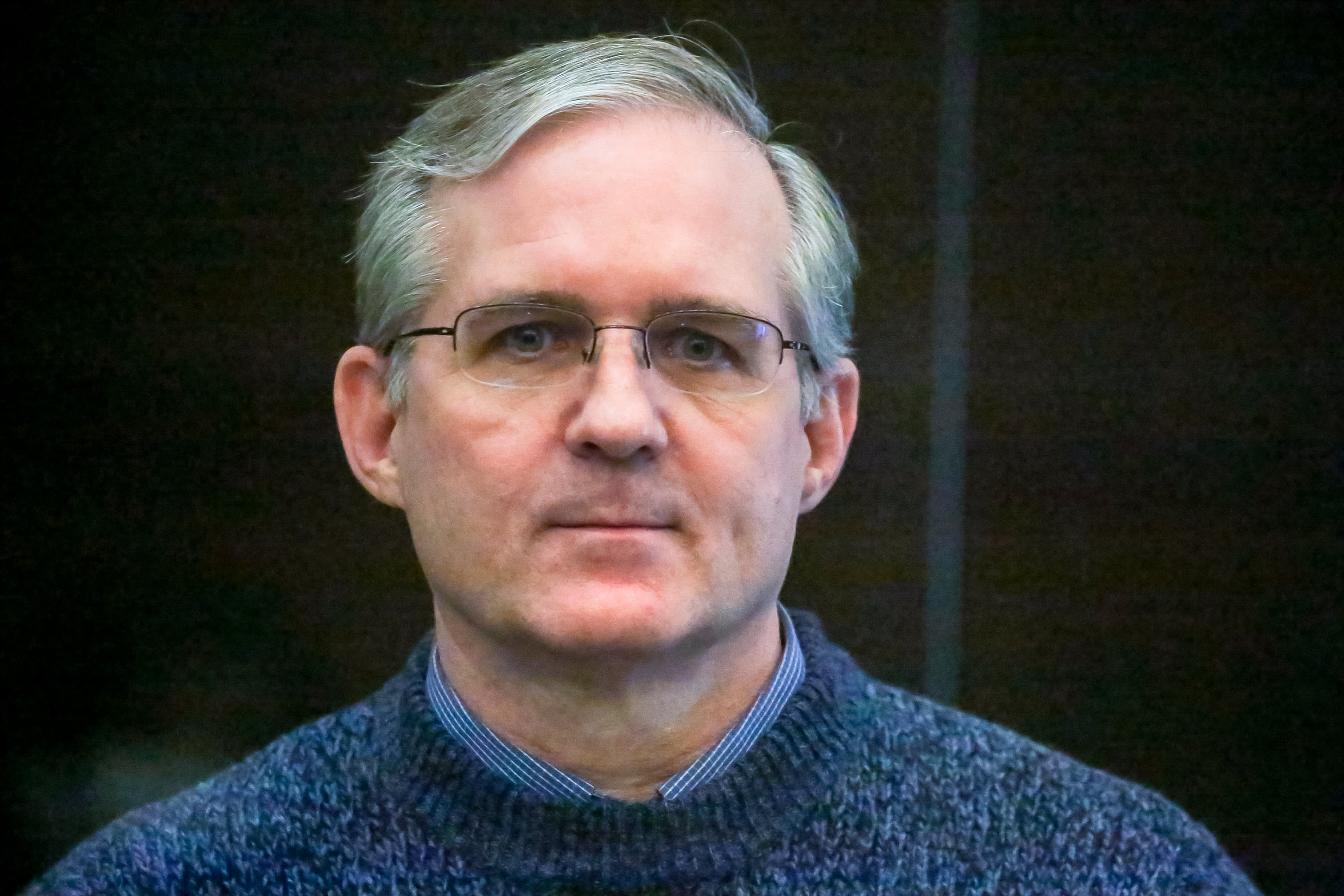
WNBA star Brittney Griner’s release from a Russian jail as part of a prisoner swap deal is being hailed as a momentous diplomatic breakthrough, providing hope for other Americans considered “wrongfully detained” by Vladimir Putin’s administration.
Ms Griner, 32, was arrested at a Moscow airport on 17 February on highly questionable drug-trafficking charges after she was found to be in possession of cannabis oil for use in a vape pen, the incident occurring just a week before Russia launched its illegal invasion of Ukraine.
The basketball star, who was sentenced to nine years behind bars in August, is being exchanged for Russian arms dealer Viktor Bout, nicknamed the “Merchant of Death”, after months of negotiations and is now on a plane home.
“We never stopped pushing for her release,” said a jubilant Joe Biden from the Roosevelt Room of the White House, appearing with Ms Griner’s wife Cherelle Griner, vice president Kamala Harris and secretary of state Antony Blinken.
“It took painstaking and intensive negotiations and I want to thank all the hard-working public servants across my administration, who worked tirelessly to secure her release.”
The US president also said his administration would “never give up” trying to free other Americans who have been wrongfully detained by Russia, including former US Marine Paul Whelan, who has been in Russian custody since he was arrested just after Christmas in 2018 on what American officials have described as bogus spying charges.
Mr Whelan, 52, was initially included in swap proposals by the US but was not part of the agreement reached this week, forcing Mr Biden to deny prioritising Ms Griner’s return over his, telling reporters that there “was not a choice of which American to bring home”.
Mr Whelan reacted to the news in a CNN interview from a Russian jail cell, saying he is “greatly disappointed” to have been left out of the swap.
He said that while welcomed Ms Griner’s release from Russian custody, he had been “led to believe things were moving in the right direction” with efforts to secure his release.
“I don’t understand why I’m still sitting here,” he said, calling himself a victim of “political extortion”.
“They’ve always considered me to be at a higher level than other criminals of my sort and for whatever reason, I’m treated differently than another individual here from a Western country that’s also on a charge of espionage.”
He called on the Biden administration to do whatever it took to get him home, “regardless of the price they might have to pay”.
“My bags are packed. I’m ready to go home. I just need an airplane to come and get me,” he said.
In a statement emailed to several news outlets, Mr Whelan’s twin brother David Whelan welcomed the news about Ms Griner but said: “I can’t even fathom how Paul will feel when he learns. Paul has worked so hard to survive nearly four years of this injustice.
“His hopes had soared with the knowledge that the US government was taking concrete steps for once towards his release. He’d been worrying about where he’d live when he got back to the US.”
Mr Whelan, a US, Canadian, British and Irish citizen, was born in Ottawa, Ontario, in 1970, raised in Ann Arbour and reportedly served as a part-time police officer in Chelsea, Michigan, between 1990 and 1996 and as a patrol officer in Keego Harbor in the same state between 1998 and 2000.
He worked on-and-off as an IT manager for a company called Kelly Services over the next 15 years, taking time out to serve with the US Marine Corps Reserve from 2003 to 2008, serving in Iraq in administrative roles.
After a court-martial conviction in January 2008 on multiple counts “related to larceny”, Mr Whelan was sentenced to 60 days restriction, suffered a pay reduction and was hit with a bad conduct discharge.
He had travelled to Russia several times on business prior to his arrest by the FSB at a Hotel Metropol Moscow on 28 December 2018, at which point he was working as director of global security and investigations for BorgWarner, a Michigan-based auto parts manufacturer, but visiting to attend the wedding of a friend.
He had been due to fly back home via St Petersburg on 6 January 2019.

Instead, he was accused of taking delivery of a USB drive containing security-sensitive information and formally charged with espionage offences on 3 January, which Mr Whelan strongly denied.
Held at Moscow’s Lefortovo Prison, he was convicted and sentenced to 16 years in prison on 15 June 2020.
During his trial, Mr Whelan held up a piece of paper from behind a glass screen containing slogans such as “Sham trial!”, “No human rights!” and “Paul’s life matters!” and also denounced the proceedings as an attempt by Russia to secure him fro use as leverage against the US.
“We have proven my innocence... we have proven fabrication,” he said.
“This is slimy, greasy corrupt Russian politics, nothing more, nothing less.”
His lawyer, Vladimir Zherebenkov, said Mr Whelan had many Russian friends “mostly among the military” and had been handed the flash drive unwittingly by a friend who was operating “under the control of special services” when they gave it to him.
“There were serious hopes for positive outcome but in this case political rationale, negativity towards the US and the games the special services play have led to a sad result,” Mr Zherebenkov said of the verdict.
Mr Whelan later called on then-US president Donald Trump to intervene and his secretary of state Mike Pompeo did voice American objections but Russia’s position was made clear by foreign minister Sergey Lavrov, who insisted Mr Whelan had been caught “red handed”.
John Sullivan, then-US ambassador to Russia, perhaps said it best when he issued a statement denouncing the situation by saying: “If they can do this to Paul, they can do this to anyone. A secret trial with the inability to defend oneself… It’s a mockery of justice in addition to the fact that he’s been horribly mistreated.”







